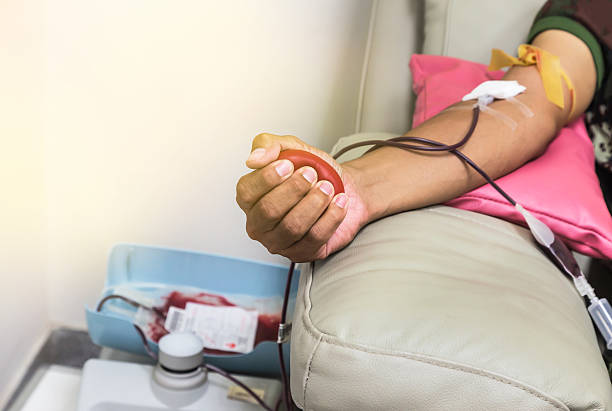Understanding Plasma Donation
Plasma donation is a critical medical procedure that helps save lives and improve health outcomes for many patients. Plasma, the liquid part of blood, contains essential proteins and antibodies vital for various medical treatments. Understanding the process and eligibility for plasma donation is essential for anyone considering this generous act.
What is Plasma?
Plasma is the yellowish, liquid component of blood, comprising about 55% of its total volume. It is primarily water but also contains proteins, electrolytes, hormones, and waste products. Plasma serves as a transport medium for nutrients, hormones, and waste products, and it plays a crucial role in maintaining blood pressure and volume.
The Importance of Plasma Donation
Plasma is used to treat patients with a variety of medical conditions, including immune deficiencies, bleeding disorders, and severe burns. It is also essential in the production of life-saving therapies for conditions such as hemophilia and other clotting disorders. Donated plasma is often transformed into therapies that benefit patients around the world.
Who Can Donate Plasma?
The eligibility criteria for plasma donation are similar to those for whole blood donation, but there are some additional considerations. Generally, donors must be in good health, weigh at least 110 pounds, and be at least 18 years old. Specific criteria may vary depending on the donation center and country.
Health and Safety Requirements
Potential donors must undergo a health screening process to ensure they are fit to donate. This includes a medical history review, physical examination, and tests for infectious diseases. Donors should be free of chronic illnesses and infections to prevent complications and ensure the safety of the plasma supply.
The Donation Process
The plasma donation process is known as plasmapheresis. During this procedure, blood is drawn from the donor, the plasma is separated, and the remaining components, such as red blood cells and platelets, are returned to the donor. This process typically takes about 90 minutes to two hours.
Preparation for Donation
Donors should prepare for their plasma donation by staying well-hydrated, eating a healthy meal, and avoiding alcohol and caffeine. It is also important to bring identification and any necessary medical documentation to the donation center.
After the Donation
After donating plasma, donors are advised to rest, stay hydrated, and avoid strenuous activities for the rest of the day. Some donors may experience mild side effects such as dizziness or fatigue, but these are usually temporary.
Frequency of Plasma Donation
Unlike whole blood donation, which can only be done every 56 days, plasma can be donated more frequently. In many cases, donors can give plasma up to twice a week, with at least 48 hours between donations. However, donation centers and regulations may have specific guidelines.
Benefits of Plasma Donation
Plasma donation has several benefits for donors. In addition to the satisfaction of helping others, many donation centers offer compensation or incentives. Regular donors also receive health screenings and tests, which can provide valuable health information.
Risks and Side Effects
While plasma donation is generally safe, it is not without risks. Some donors may experience side effects such as dehydration, bruising at the needle site, or fainting. In rare cases, more serious complications can occur, but these are uncommon.
Who Should Avoid Donating Plasma?
Certain individuals should avoid donating plasma. These include people with chronic diseases, infectious diseases, or recent tattoos or piercings. Pregnant women and individuals who have recently undergone major surgery may also be advised against donating.
Ethical Considerations
Plasma donation raises ethical considerations, particularly around compensation and the commercialization of plasma. While compensated donation can increase the plasma supply, it also raises concerns about exploitation and the quality of donated plasma.
The Impact of Plasma Donation
Plasma donation has a profound impact on the lives of recipients. For patients with life-threatening conditions, donated plasma can mean the difference between life and death. The therapies derived from plasma help manage and treat a wide range of conditions, improving the quality of life for countless individuals.
Plasma Donation Centers
There are numerous plasma donation centers worldwide, each with its own protocols and requirements. It is important to choose a reputable center that adheres to stringent safety and ethical standards. Researching and selecting a center with positive reviews and a history of safe practices can ensure a positive donation experience.
The Future of Plasma Donation
Advancements in medical technology and increased awareness of the importance of plasma donation are driving changes in the field. Future developments may include more efficient donation processes, improved donor screening, and enhanced safety protocols. These innovations have the potential to increase the plasma supply and improve outcomes for recipients.
Encouraging Plasma Donation
Encouraging plasma donation requires a multifaceted approach. Public awareness campaigns, education, and community engagement are key strategies. Highlighting personal stories of recipients and the impact of donated plasma can inspire more individuals to become donors.
Personal Stories and Testimonials
Personal stories from plasma donors and recipients can be powerful motivators. Donors often describe a sense of fulfillment and purpose, knowing their contribution is making a difference. Recipients, on the other hand, share stories of improved health and renewed hope, illustrating the tangible benefits of plasma donation.
Community Involvement
Community involvement plays a crucial role in promoting plasma donation. Local events, partnerships with organizations, and volunteer opportunities can create a supportive environment for donors. Engaging with the community through social media, newsletters, and informational sessions can also help spread the word.
Overcoming Myths and Misconceptions
There are many myths and misconceptions about plasma donation that can deter potential donors. Addressing common concerns, such as fears about the safety of the procedure or misunderstandings about eligibility, is essential. Providing accurate information and resources can help dispel these myths and encourage more people to donate.
The Role of Healthcare Providers
Healthcare providers play a pivotal role in plasma donation. By educating patients about the benefits and importance of donating plasma, they can help increase the donor pool. Providers can also identify and refer eligible donors, ensuring a steady supply of plasma for those in need.
Corporate and Institutional Support
Support from corporations and institutions can significantly boost plasma donation efforts. Corporate donation drives, sponsorships, and employee incentive programs can encourage participation. Institutions such as universities and hospitals can also play a key role by hosting donation events and providing resources.
Government and Regulatory Agencies
Government and regulatory agencies oversee plasma donation to ensure safety and ethical standards. These bodies set guidelines for donor eligibility, screening processes, and the handling of donated plasma. Their role is crucial in maintaining public trust and ensuring the integrity of the plasma supply.
Conclusion
Plasma donation is a vital process that saves lives and improves health outcomes for many patients. Understanding the importance, process, and impact of plasma donation can inspire more individuals to become donors. With continued education, community involvement, and support from healthcare providers and institutions, the future of plasma donation looks promising. By donating plasma, individuals can make a significant and lasting difference in the lives of others.




